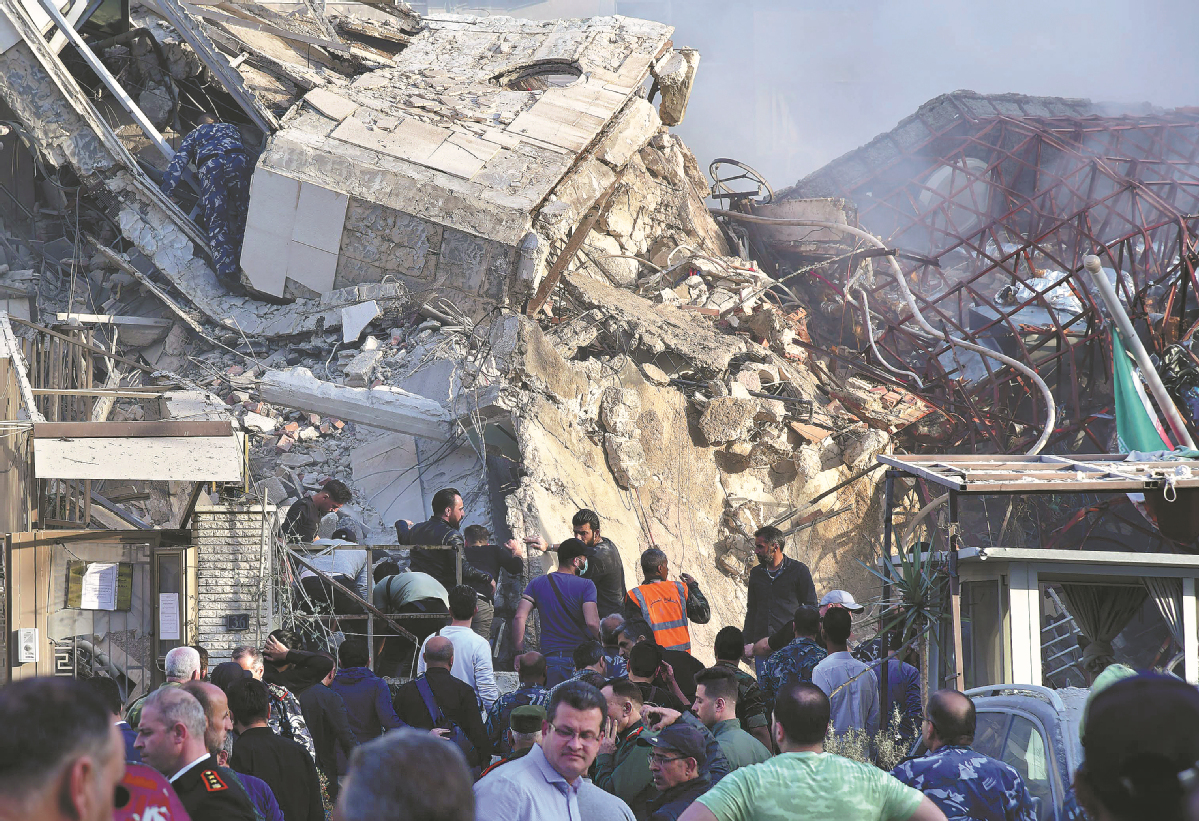
Rescuers work near the destroyed building of the Iranian consulate in Damascus, Syria, on Monday. At least 10 people were killed in the airstrikes on the building, according to the Iranian ambassador to Syria and other sources. AMMAR SAFARJALANI/XINHUA
The airstrikes that destroyed Iran's consulate in Damascus, Syria, and killed at least 10 people late on Monday have been widely condemned as a violation of international law and Syrian sovereignty, and are seen as a possible trigger for escalating regional tensions amid the humanitarian crisis in the Gaza Strip.
The 30-year-old consulate building, located next to the Iranian embassy in the Syrian capital, was attacked with missiles purportedly fired by Israel.
While neither the Israeli Prime Minister's Office nor the Israel Defense Forces has commented on the airstrikes, The New York Times cited unnamed Israeli officials as confirming Israel's role in the attack.
The attack killed Brigadier General Mohammad Reza Zahedi, a commander of the elite Quds Force of Iran's Islamic Revolutionary Guard Corps, and Zahedi's deputy, Mohammad Hadi Haji Rahimi, according to state-run media outlet Tasnim News Agency.
This is the first military attack on an Iranian diplomatic compound, although Israeli airstrikes have hit so-called Iran-related targets in Syria a number of times, including those on Sunday that resulted in civilian casualties, Xinhua News Agency cited the Syrian Defense Ministry as saying.
Iranian Foreign Minister Hossein Amir-Abdollahian said the Israeli attack on Iran's consulate in Syria "is a violation of all international obligations".
In a phone conversation on Monday with his Syrian counterpart Faisal Mekdad, he said that Israeli Prime Minister Benjamin Netanyahu "has completely lost his mental balance "because of the "consecutive failures of the Israeli regime in Gaza", Iran's Mehr News Agency reported.
Mekdad, who visited the attack site in Damascus, also strongly condemned Israel's "aggression", Xinhua reported.
In a letter to United Nations Secretary-General Antonio Guterres and UN Security Council President for April Vanessa Frazier on Monday, Zahra Ershadi, ambassador and charge d'affaires of the Islamic Republic of Iran to the UN, called upon the Security Council to "take all necessary measures" to address "this egregious violation".
"These horrific crimes and cowardly terrorist attacks are a flagrant violation of the United Nations Charter, international law, and the foundational principle of the inviolability of diplomatic and consular premises," Ershadi said in the letter, urging the UN to "ensure that those responsible for such criminal acts are swiftly brought to justice".
"Considering the far-reaching international implications of such a reprehensible act, which can exacerbate tensions in the region and potentially ignite more conflict involving other nations, the Islamic Republic of Iran urges the Security Council to condemn this unjustified criminal act and terrorist attack perpetrated by the Israeli regime in the strongest terms possible," the letter added.
Wang Wenbin, a spokesman for the Chinese Foreign Ministry, said that Beijing condemns the attack on the Iranian consulate in Syria.
"The security of diplomatic missions brooks no violation, and Syria's sovereignty, independence and territorial integrity should be respected," he said on Tuesday at a regular news conference in Beijing.
Wang added that amid the current volatile situation in the Middle East, China opposes any actions that could escalate tensions.
Meanwhile, Syrian and Iranian protesters burned flags of Israel and the United States, blaming the latter for supporting Israel and calling for "forceful responses" to the attack. The Iranian Foreign Ministry said the country has the right to retaliate.
Several other nations, including Saudi Arabia, Qatar, Jordan, Iraq, Oman, the United Arab Emirates and Pakistan, condemned the airstrikes.
The Saudi Foreign Ministry expressed in a statement its "categorical rejection of targeting diplomatic facilities for any justification and under any pretext", adding that the attack was "a violation of international diplomatic laws and the rules of diplomatic immunity".
The Qatari Foreign Ministry said it considers the attack a "flagrant violation" of international agreements and diplomatic norms that "criminalize attacks on the premises of diplomatic missions". It also urged the need to provide better protection for diplomatic and consular missions under the rules of international law.
The Russian Foreign Ministry said in a statement, "We strongly condemn this unacceptable attack against the Iranian consular mission in Syria."
Abdalfatah Asqool, a lecturer on international law at the University of Palestine, told China Daily that the attack on the Iranian diplomatic mission in Damascus is "a violation of sovereignty of both Iran and Syria", as the land on which the attack took place is considered a part of the Iranian territory according to international law.
"According to international humanitarian law, this Israeli attack is classified as a crime of aggression," he added.













